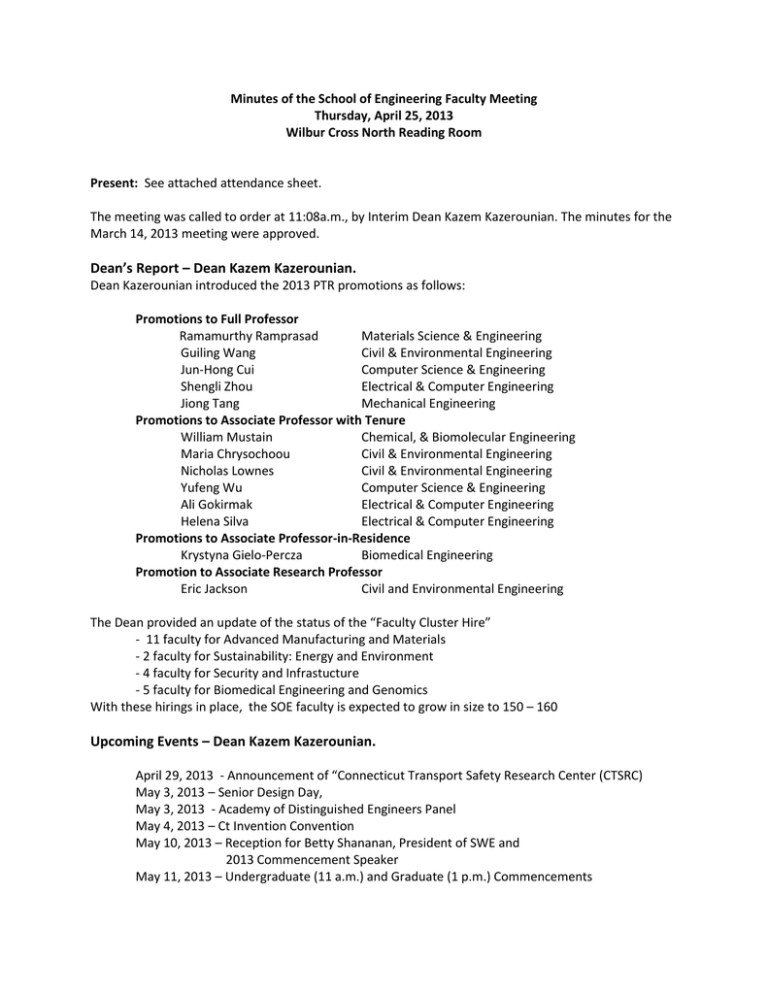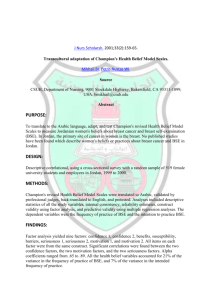Minutes of the School of Engineering Faculty Meeting
advertisement

Minutes of the School of Engineering Faculty Meeting Thursday, April 25, 2013 Wilbur Cross North Reading Room Present: See attached attendance sheet. The meeting was called to order at 11:08a.m., by Interim Dean Kazem Kazerounian. The minutes for the March 14, 2013 meeting were approved. Dean’s Report – Dean Kazem Kazerounian. Dean Kazerounian introduced the 2013 PTR promotions as follows: Promotions to Full Professor Ramamurthy Ramprasad Materials Science & Engineering Guiling Wang Civil & Environmental Engineering Jun-Hong Cui Computer Science & Engineering Shengli Zhou Electrical & Computer Engineering Jiong Tang Mechanical Engineering Promotions to Associate Professor with Tenure William Mustain Chemical, & Biomolecular Engineering Maria Chrysochoou Civil & Environmental Engineering Nicholas Lownes Civil & Environmental Engineering Yufeng Wu Computer Science & Engineering Ali Gokirmak Electrical & Computer Engineering Helena Silva Electrical & Computer Engineering Promotions to Associate Professor-in-Residence Krystyna Gielo-Percza Biomedical Engineering Promotion to Associate Research Professor Eric Jackson Civil and Environmental Engineering The Dean provided an update of the status of the “Faculty Cluster Hire” - 11 faculty for Advanced Manufacturing and Materials - 2 faculty for Sustainability: Energy and Environment - 4 faculty for Security and Infrastucture - 5 faculty for Biomedical Engineering and Genomics With these hirings in place, the SOE faculty is expected to grow in size to 150 – 160 Upcoming Events – Dean Kazem Kazerounian. April 29, 2013 - Announcement of “Connecticut Transport Safety Research Center (CTSRC) May 3, 2013 – Senior Design Day, May 3, 2013 - Academy of Distinguished Engineers Panel May 4, 2013 – Ct Invention Convention May 10, 2013 – Reception for Betty Shananan, President of SWE and 2013 Commencement Speaker May 11, 2013 – Undergraduate (11 a.m.) and Graduate (1 p.m.) Commencements Faculty & Staff Recognition - Senior Associate Dean Michael Accorsi Associate Dean Accorsi introduced the 2012/2013 recipients of the following recognition awards: Outstanding faculty Advisor Award: Pamir Alpay Professor, MSE Reda Ammar Professor, CSE Wei Sun Associate Professor, ME Shengli Zhou Professor, ECE ECE Outstanding Faculty Mentoring Awards: Jun-Hong Cui Associate Professor, CSE Ranjan Srivastava Associate Professor, CBE Employee Recognition for 10, 15, 20, and 25 years of employment: Ross Bagtzoglou, Department Head & Professor, CEE (10yrs) Tom Barber, Professor-in-Residence, ME (10yrs) John Chandy, Associate Professor & Associate Head, ECE t (10yrs) R. Brent Garber, Technical Assistant I, ECE Department (10yrs) Swapna Gokhale, Associate Professor, CSE Department (10yrs) Sharon McDermott, Program Coordinator, Undergraduate Education & Diversity (10yrs) Kevin McLaughlin, Program Director, Undergraduate Education & Diversity (10yrs) Laurent Michel, Associate Professor, CSE Department (10yrs) Peter Menard, Design Technician III, C2E2 (10yrs) Deb Mielczarek, Business Manager I, CSE (10yrs) Sanguthevar Rajasekaran, UTC Professor & Director, BECAT (10yrs) Michael Renfro, Associate Department Head & Associate Professor, ME (10yrs) Ranjan Srivastava, Associate Professor, CMBE & Director, Biomolecular Engineering (10yrs) Jiong Tang, Associate Professor, ME Department (10yrs) Jacki Veronese, Administrative Coordinator, ME Department (10yrs) Mei Wei, Professor, CMBE & Associate Dean for Research & Graduate Education (10yrs) Kevin Murphy, Associate Professor, ME Department (15yrs) Alexander Shvartsman, Professor, CSE Department (15yrs) Bob Weiner, Computer Technical Support Consultant IV, ETS (15yrs) Joy Erickson, Academic Assistant, ODE; LSAMP Coordinator (20yrs) Susan Soucy, Administrative Coordinator, CMBE Department (20yrs) Bi Zhang, Professor, ME Department (20yrs) Steve Demurjian, Professor, CSE (25yrs) Baki Cetegen, UTC Chair Professor & Department Head, ME Department (25yrs) Norman Garrick, Associate Professor, CEE Department (25yrs) Robert McCartney, Associate Professor, CSE Department (25yrs) Stephanie Merrall , Program Coordinator, CTI (25yrs) Marty Wood, Assistant Dean, Undergraduate Education & Diversity (25yrs) Undergraduate Affairs – Associate Dean Dan Burkey Associate Dean Burkey presented the recommendations of Courses and Curriculum Committee (Appendix A). Associate Dean Burkey made the following motion to award degrees: That the faculty recommend to the Board of Trustees that they grant the degree of Bachelor of Science in Engineering to the following students who have majored in Biomedical Engineering, Chemical Engineering, Civil Engineering, Computer Engineering, Computer Science & Engineering, Electrical Engineering, Engineering Physics, Environmental Engineering, Materials Science & Engineering or Mechanical Engineering and that they grant the degree of Bachelor of Science to the following students who have majored in Computer Science or Management & Engineering for Manufacturing, effective May 11, 2013 and August 2013, providing that a committee consisting of the Associate Dean, Director of Advising and Degree Auditor be authorized to withhold any degree for which the requirements have not been met on Commencement Day or to add the name of any person to the list who has met the requirement for a degree on Commencement Day. (Appendix B for list of students) The motion passed without objection Associate Dean Burkey presented updates on admission trends for the period 2010-2013 and indicated an increase of over 20% for 2013 freshman admission over the previous year. Open Forum – Donna Thibault Topics presented and discussed at the Open Forum include: a) Online advising ( lead, Brian Schwarz) b) Science of Acupuncture (lead, Bi Zhang) c) Permanent TA lines Special Presentation : Faculty Research – Peter Luh, ECE Prof. Peter Luh gave a presentation on the research work being conducted by his group on “Smart Building and Smart Grid”. The meeting was adjourned at 12:19p.m. Respectfully submitted, Eric Donkor Secretary to the Faculty APPENDIX A Recommendations of SoE Courses & Curriculum Committee SOE C&C Committee Meeting – April 17, 2013 A. Introductions B. Old Business a. ECE - new course in Nanophotonics b. ECE – removed Non- ECE Professional Requirements c. ECE – removed cross-listing with BME 3101 C. New Business a. CBE – New Capstone Design sequence b. CSE – new course - Introduction to Modern Cryptography c. ECE – change pre-requisites to ECE 4242 and Senior Design to align with new junior year curriculum ECE – Require to be in School of Engineering to take any ECE 3000 or above classes d. MSE – Updated Nanomaterials minor MSE – Updated Biomaterials, nanomaterials, and metallurgy concentrations B. Old Business: ECE Curricula and Courses Committee The following changes were approved by the ECE Curricula and Courses Committee on March 22, 2012 and ECE Faculty on April 5, 2012 1. New nanophotonics courses 4223 Nanophotonics Three credits. One 3-hour lecture. Prerequisite: ECE3223. Principles and applications of nanophotonics with focus on optical metamaterials, plasmonics, and photonic bandgap crystals. Topics covered include electric plasma, magnetic plasma, optical magnetism, negative index metamaterials, localized and non-localized surface plasmon polaritons, photonic bandgap structures, superlens, optical cloaking. 5223 Nanophotonics Three credits. One 3-hour lecture. Recommended preparation: ECE3223. This course and ECE4223 may not both be taken for credit. Fundamental principles and applications of nanophotonics with focus on optical metamaterials, plasmonics, and photonic bandgap crystals. Topics covered include electric plasma, magnetic plasma, optical magnetism, negative index metamaterials, localized and non-localized surface plasmon polaritons, photonic bandgap structures, superlens, optical cloaking, surface enhanced Raman spectroscopy, transformation optics, plasmonic sensors, plasmonic waveguides. 2. Remove the non-ECE PR requirement. Thus, students will be required to take 4 PRs, of which at least two must be ECE courses. 3. Change to ECE6122 ECE6122 (3 credits) Digital signal Processing This course and ECE4131 may not both be taken for credit. Discrete-time signals and systems. the z-transform. The Discrete Fourier Transform (DFT). Convolution and sectioned convolution of sequences. IIR and FIR digital filter design and realization. Computation of the DFT: the Fast Fourier Transform (FFT), algorithms. Decimation and interpolation. Parametric and nonparametric spectral estimation. Adaptive filtering. finite word length effects. Components: Lecture 4. Remove the cross-listing of ECE3301 with BME3101 (Intro to Biomedical Engineering) and eventually remove ECE3301 completely from the catalog. To: The C & C Committee, ECE Department From: Eric Donkor Re: Request for Catalog number for a new undergraduate course. - - - - - - - - - - - - - - - - - - - - - - - - - - - - - - - - - - - - - - - - - -Current Course Number: ECE 4095 Course Title: Nanophotonics Instructor: Eric Donkor, Previous semester offering: Spring 2012 Required Text: 1) Optical Metamaterials: Fundamentals and Applications Wenshan Cai, Vladimir Shalaev, Springer 2) Plasmonics: Fundamentals and Applications Stefan A. Maier, Springer Others: 1) Instructor lecture notes 2) Reference text: Photonic Crystals John D. Jaonnopoulis, Robert D. Meade, Joshua N. Winn, Princeton Univ. Press Background: The new nanophotonics course (currently assigned course number ECE 4095) is designed for senior level undergraduates the purpose of which is to expose students to the field of nanophotonics. The course may be positioned in the ECE undergraduate course sequence as a follow-up to ECE 3223 Optical Engineering - and may serve as an Elective and/or “Professional Requirement” for a student “Plan of Study”. Its initial offering is for the current Spring 2012 semester, and has eight undergraduate students enrolled. Catalog Description and Course Syllabus. Catalog course number: To be assigned Catalog course title: Nanophotonics Semester Offering: Spring semester Number of Credits: 3 Contact hours: One 3-hrs lecture per week Prerequisite: ECE 3223, or consent of instructor Catalog Description: Principles and applications of nanophotonics with focus on optical metamaterials, plasmonics, and photonic bandgap crystals. Topics covered include electric plasma, magnetic plasma, optical magnetism, negative index matematerials, localized and non-localized surface plasmon polaritons, photonic bandgap structures, superlens, optical cloaking. Syllabus: Optical properties of metal-dielectric mixtures Electric metamaterials Magnetic metamaterials Negative index metamaterials Surface plasmon at metal-dielectric interface Excitation of surface plasmons polaritons at planar interfaces Localized surface plasmons 1D, 2D and 3D photonic crystals Super resolution with meta-lenses Surface plasmon sensors Surface enhanced Raman spectroscopy To: The C & C Committee, ECE Department From: Eric Donkor Re: Request for catalog number for a new graduate course. - - - - - - - - - - - - - - - - - - - - - - - - - - - - - - - - - - - - - - - - - -Current Course Number: ECE 6095 Course Title: Nanophotonics Instructor: Eric Donkor, Previous semester offering: Spring 2012 Required Text: 3) Optical Metamaterials: Fundamentals and Applications Wenshan Cai, Vladimir Shalaev, Springer 4) Plasmonics: Fundamentals and Applications Stefan A. Maier, Springer 5) Photonic Crystals John D. Jaonnopoulis, Robert D. Meade, Joshua N. Winn, Princeton Univ. Press Catalog Description and Course Syllabus. Catalog course number: To be assigned Catalog course title: Nanophotonics Semester Offering: Spring semester Number of Credits: 3 Contact hours: One 3-hrs lecture per week Prerequisite: ECE 3223, or consent of instructor Course Description Fundamental principles and applications of nanophotonics with focus on optical metamaterials, plasmonics, and photonic bandgap crystals. Topics covered include electric plasma, magnetic plasma, optical magnetism, negative index matematerials, localized and non-localized surface plasmon polaritons, photonic bandgap structures, superlens, optical cloaking, surface enhanced Raman spectroscopy, transformation optics, plasmonic sensors, plasmonic waveguides. Syllabus: Optical properties of metal-dielectric mixtures Electric metamaterials Magnetic metamaterials Negative index metamaterials Surface plasmon at metal-dielectric interface Excitation of surface plasmons polaritons at planar interfaces Localized surface plasmons 1D, 2D and 3D photonic crystals Super resolution with meta-lenses Transformation optics and optical cloaking Surface plasmon sensors Surface enhanced Raman spectroscopy New Business: a. CBE – New Capstone Design Sequence Chemical & Biomolecular Engineering: Existing Senior Design Sequence: 4140. Unit Operations and Introduction to Design Two credits. Prerequisite: CHEG 3112, 3123, 3124, and 3151. Corequisite: CHEG 4142. Theoretical treatment and design of large-scale chemical engineering unit operations. Chemical engineering process synthesis and design; comparison of alternative processing steps; instrumentation; cost estimation; economic analysis; process optimization; emphasis on conceptual design in application of chemical engineering principles; design of process equipment, computer-aided design of equipment and flow sheets; design and analysis of complete process plants. 4142. Process Simulation Laboratory Two credits. Corequisite: CHEG 4140. Computer-based simulation of chemical engineering processes and integration of multiple processes into a holistic plant design using modern chemical engineering process design tools. 4143. Process Design and Economics (243) Three credits. Prerequisite: CHEG 4140 and 4142. Continuation of CHEG 4142. Students will continue work on chemical process and simulation projects assigned during the fall semester. Spring semester will focus on group work, written and oral communication, and presentation of the final project, which analyzes a chemical process from a technical, economic, safety, and environmental perspective. Proposed Revised Design Sequence: 4140. Chemical Engineering Capstone Design 1 One credit. Prerequisite: CHEG 3112, 3123, 3124, and 3151. Corequisite: CHEG 4142. Theoretical treatment and design chemical engineering processes and/or products. Comparison of alternative processing steps; instrumentation; cost estimation; economic analysis; process optimization; Safety and environmental concerns in design; ethical considerations in chemical engineering design; emphasis on conceptual design in application of chemical engineering principles. 4142. Unit Operations and Process Simulation Three credits. Corequisite: CHEG 4140. Design and analysis of chemical engineering unit operations and process equipment, computer-aided design of equipment and flow sheets; design and analysis of complete process plants. Computer-based simulation of chemical engineering processes and integration of multiple processes into a holistic plant design using modern chemical engineering process design tools. 4143. Chemical Engineering Capstone Design 2 Three credits. Prerequisite: CHEG 4140 and 4142. Continuation of CHEG 4140. Students will continue work on chemical process and simulation projects assigned during the fall semester. Spring semester will focus on group work, written and oral communication, and presentation of the final project, which analyzes a chemical process from a technical, economic, safety, and environmental perspective. CSE department: new course (for SOE C&C, April 17, 2013) The CSE department proposes a new undergraduate course, Introduction to Modern Cryptography. We have not had this course at the undergraduate level, but it should fit well with CSE 4707, Computer Security. Catalog copy: CSE 4702. Introduction to Modern Cryptography Three credits. Prerequisites: CSE 3500 and CSE 3502. An introduction to the fundamentals of modern cryptography focusing on development of secure cryptographic tools based on hard computational problems. Topics include one-way functions, pseudorandom generators, encryption, digital signatures, and protocols. Rationale: There is a good deal of interest in cryptography and security by the CSE undergraduates. Additionally, this would act as another professional requirement course for CSE students. We currently have two graduate courses in the area, CSE 5852 (Modern Cryptography: Foundations) and CSE 5854 (Modern Cryptography: Primitives and Protocols); this course most closely resembles CSE 5852, taught at a level appropriate for advanced undergraduates. ECE Curricula and Courses Committee The following changes were approved by the ECE Curricula and Courses Committee on April 5, 2013 5. Change prereqs for ECE4242 4242. Micro/Opto-electronic Devices and Circuits Fabrication Laboratory (268) Three credits. One class period, and one 4-hour laboratory period. Prerequisite: ECE 3221, 4211 or 4225. Semiconductor wafer preparation and characterization including: determination of carrier concentration, mobility, and lifetime; oxidation, diffusion, metallization, mask layouts, and photolithographic techniques as employed in the realization of discrete devices (e.g., bipolar and MOS transistors, solar cells) and integrated circuits; design of basic IC components such as transistors, resistors, and capacitors; monolithic fabrication of simple digital/analog circuits. Design project. Written and oral presentations of laboratory results. A fee of $75 is charged for this course. 6. Add ECE3101 and ECE3201 as prereqs for Senior Design 4901. Electrical and Computer Engineering Design I (290) (Also offered as CSE 4950.) Two credits. Prerequisite: ECE3101, ECE3201, and Senior standing. Discussion of the design process; project statement, specification, project planning, scheduling and division of responsibility, ethics in engineering design, safety, environmental considerations, economic constraints, liability, manufacturing, and marketing. Projects are carried out using a teambased approach. Selection and analysis of a design project to be undertaken in CSE 4951/ECE 4902 is carried out. Written progress reports, a proposal, an interim project report, a final report, and oral presentations are required. 7. Require to be in School of Engineering to take any ECE 3000 or above classes Materials Science & Engineering Nanomaterials Minors (Catalog) This minor offers the fundamentals and understanding in nanoscale materials physics and chemistry, synthesis and characterization techniques, nanodevices fabrication, testing and applications, which are derived from the latest progress and documentation in the nanoscience and nanotechnology. It requires the completion of 15 credits including the following: • Application for the MSE Minor two semesters before graduation • An approved Plan of Study one semester before graduation • MSE 2001 (or 2101) and 2002 (or 2102) • 9 credits selected from Group II courses containing MSE 4001, 4240, 4241, and 4095 (if related to nanomaterials) Note: Group II courses cannot be simultaneously used towards the Materials Science & Engineering Minor and the Nanomaterials Minor. Nanomaterials Minor (proposed) This minor exposes non-Materials Science and Engineering students to the fundamentals and applications of nanoscale materials. This includes synthesis and characterization techniques, nanodevice fabrication methods, testing and applications, and underlying MS&E, physics and chemistry principles. Content in this fast developing area is frequently based on recent progress and reports documentation in the nanoscience and nanotechnology disciplines, and is extensively interdisciplinary. The minor requires the completion of 15 credits including as follows: Application for the MSE Minor two semesters before graduation. An approved Plan of Study one semester before graduation. MSE 2001 (or 2101)and2002 (or 2102) 9 credits selected from Group II courses containing: MSE 4001,4240,4241, Eng 3195, and/or 4095, (if significantly nano-related, subject to approval by Minor advisor) Note: Group II courses cannot simultaneously be used towards multiple minors, e.g. the Materials Science & Engineering Minor and the Nanomaterials Minor. Justifications: The nanomaterials minor has been updated to incorporate newly developed courses that are applicable, and to remove those that are infrequently or no longer taught. Additional flexibility in course selection is also offered to accommodate complicated student scheduling challenges (e.g. Eurotech or transfer students). Finally, the overall description has generally been improved. Biomaterials Concentration (Catalog) The four-course sequence, MCB 2000, CHEM 2443, BME 3700, and BME 4701, constitutes the Biomaterials concentration. These MSE professional and technical elective courses are appropriate for undergraduate students in their Junior and Senior years. The courses will review different biomaterials including, metals, ceramics, polymers, composites and natural materials, focusing on materials for hard tissue replacement, tissue engineering scaffolds, materials for drug delivery applications and other emerging fields. Biomaterials Concentration MCB 2000 CHEM 2443 BME 3700 BME 4701 Biomaterials Concentration (proposed) The biomaterials concentration is a four-course (minimum 12 credits) series based on a range of electives that emphasize on biology, biomaterials and tissue engineering. Each student must take at least one of three electives: “Biomaterials” (MSE 3700), “Advanced Biomaterials” (BME 4701), or “Introduction to Tissue Engineering” (BME 4710). These courses introduce a variety of topics, including: a series of biomaterials, such as metallic, ceramic, polymeric, composite and natural biomaterials; the application of biomaterials, such as drug delivery, orthopedic implants etc.; the role of biomaterials in tissue engineering; interactions between biomaterials, especially scaffolds, and cells; tissue engineering scaffold fabrication and stem cells. Reflecting the interdisciplinary nature of biomaterials study, the remaining 9 credits may be selected from a series of courses drawn from different departments, including “BIOL 1107: Principles of Biology”, “MCB 2210: Cell Biology”, “CHEM 2443: Organic Chemistry” and “BME 4xxx: Advanced Tissue Engineering”. These courses will review the fundamentals in biology, cell biology and organic chemistry, and they will also provide the recent development in the field of biomaterials and tissue engineering. Biomaterials-advisor-approved research in faculty labs directly related to biomaterials study may be taken up to 3 of the 9 elective credits as well (MSE 4095) . All courses may be taken in any order. At least one of the following: MSE 3700: Biomaterials BME 4701: Advanced Biomaterials BME 4710: Introduction to Tissue Engineering, 3 credits The rest of the courses can be selected from any above or the following: BIOL 1107: Principles of Biology MCB 2210: Cell Biology CHEM 2443: Organic Chemistry BME Sp-14: Special Topics UG/G course: Regenerative Medicine and Engineering MSE 4095: Significantly biomaterials-related research in faculty labs (3 credits total, may be split across multiple terms, must be approved by biomaterials faculty advisor). New courses developed by various UConn departments involving significant biomaterials content, with approval of the bioomaterials advisor. Reasons for change: Provide more flexibility to students and reflect the true interdisciplinary nature of the biomaterial study. BIOL 1107, 1108. Principles of Biology (107, 108) May be taken in either order. Four credits. Three class periods and one 3-hour laboratory period. Students may not receive more than 12 credits for courses in biology at the 1000's level. A course in high school level chemistry or concurrent enrollment in CHEM 1127 are recommended for students enrolling in 1107. Designed to provide a foundation for more advanced courses in Biology and related sciences. Topics covered include molecular and cell biology, animal anatomy and physiology (BIOL 1107); ecology, evolution, genetics, and plant biology (BIOL 1108). Laboratory exercises in BIOL 1107 include dissection of preserved animals. A fee of $10 is charged for this course. CA 3-LAB. MCB 2210. Cell Biology (210) Three credits. Prerequisite: BIOL 1107. This course is intended to be taken before MCB 2000 or 3010. Structural organization of cells and the molecular basis of dynamic cellular processes, with emphasis on eukaryotic cells. Topics include protein targeting, vesicle trafficking, cytoskeleton, cell-cell interactions in tissues, and the molecular basis of related human diseases. CHEM 2443. Organic Chemistry (243) Three credits. (Two credits for students who have passed CHEM 2241.) Prerequisite: CHEM 1128Q or 1138Q or 1148Q or 1126. CHEM 1126Q may be taken concurrently. Structure and reactions of the simpler classes of the compounds of carbon. MSE 3700. Biomaterials Introduction to a series of implant materials, including metals, ceramics, glass ceramics, polymers, and composites, including comparison with natural materials. Issues related to mechanical properties, biocompatibility, degradation of materials by biological systems, and biological response to artificial materials will be addressed. Particular attention will be given to the materials for the total hip prosthesis, dental restoration, and implantable medical devices. MSE 4701. Advanced Biomaterials In-depth coverage of a series of biomaterials for various applications. Topics include calcium phosphates and composites for hard tissue replacement, drug delivery systems, tissue engineering and issues unique to the biomedical field. BME 4710 Introduction to Tissue Engineering, 3 credits (274) Three credits. Prerequisite: BME 3700; open only to Biomedical Engineering majors, others by instructor consent. Presents basic principles of biological, medical, and material science as applied to implantable medical devices, drug delivery systems and artificial organs. Sp-14: Special Topics UG/G course: Regenerative Medicine and Engineering prerequisite: BME 4710/5700 Nanomaterials Concentration (Catalog) The nanomaterials concentration is a four-course sequence including two required ‘nanomaterials’ courses and two elective nanotechnology-related courses which are mainly open to junior and senior undergraduate students, with a minimum total of 12 credits to be elected. The two ‘nanomaterials’ courses, “Nanomaterials Synthesis and Design” (MSE 4240) and “Nanomaterials Characterization and Applications” (MSE 4241), will review the nanoscale materials fundamentals, synthesis and characterization techniques, nanodevices fabrication, testing and applications, which are derived from the latest progress and documentation in the nanoscience and nanotechnology. The two elective courses can be chosen from a pool reflecting the interdisciplinary nature of this topical area, which includes Physics 3401 (Introductory Quantum Mechanics), Chemistry 3563 (Physical Chemistry I), Engineering 4243 (Nanoscience and Nanotechnology I), etc. These elective courses offered from other disciplinary departments will review the fundamentals in nanoscale materials physics and chemistry as well as the fundamentals in nanomaterials-based device engineering. Nanomaterials Concentration(proposed) The nanomaterials concentration is a four-course (minimum 12 credit)series based on a range of electives that emphasize nanomaterials and nanotechnology. Each student must take at least one of three electives taught by MS&E faculty: “Nanomaterials Synthesis and Design” (MSE 4240), “Nanomaterials Characterization and Applications” (MSE 4241), or “Nanoscience and Society” (ENGR 3195). These coursesintroduce a variety of topics, including: nanoscale materials fundamentals;synthesis and characterization techniques;nanodevice fabrication, testing and applications; and the positive and negative potential impacts of nanotechnology on society. Course content draws extensivelyfrom recent publications and reports in nanoscience and nanotechnology, addressing issues in semiconductors, nano/micro-mechanical systems, catalysis and filtration, bio-interfaces, coatings, etc. Reflecting the interdisciplinary nature of nanotechnology, the remaining 9 credits may be selected from the 3 MS&E nano-courses described above, and/or from additional elective courses in physics, chemistry, electrical engineering, general engineering, and otherprograms. These elective courses will review the fundamentals in nanoscale materials physics and chemistry, and/or the fundamentals in nanomaterials-based device engineering. Nanomaterials-advisor-approved research in faculty labs directly related to nanotechnology may be taken for up to 3 of the 9 elective credits as well (MSE 4095). All courses may be taken in any order. In summary, students must take 12 credits based on: At least one of the following: MSE 4240: Nanomaterials Synthesis and Design. MSE 4241: Nanomaterials Characterization and Applications. Engineering 3195: Nanoscience and Society. And any combination of the above and/or the following: Engineering 4243: Nanoscience and Nanotechnology I-electronic devices. Engineering 4244: Nanoscience and Nanotechnology II-fabrication lab. Physics 2300: Development of Quantum physics. Physics 3401: Quantum Mechanics I. Physics 3402: Quantum Mechanics II. Chemistry 3563: Physical Chemistry I. Chemistry 3564: Physical Chemistry II. MSE 4095: Significantly nano-related research in faculty labs (3 credits total, may be split across multiple terms, must be approved by nanomaterials faculty advisor). New courses developed by various UConn departments involving significant nanomaterials content, with approval of the Nanomaterials advisor. Justifications: The nanomaterials concentration has been updated to incorporate newly developed courses that are applicable, and to remove those that are infrequently or no longer taught. Additional flexibility in course selection is also offered to accommodate complicated student scheduling challenges (e.g. Eurotech or transfer students). Finally, the overall description has generally been improved. Metallurgy Concentration (Catalog) The metallurgy concentration allows an MSE major the opportunity to select four courses from MSE 3020, ME 3228, MSE 4021, MSE 4038, MSE 3032, and MSE 4034. The four courses selected will provide in depth knowledge and understanding of manufacturing, materials selection, and design processes for contemporary and advanced alloy systems. Emphasis is placed on the application of the fundamental principles that relate processing, structure, properties, and performance of metallic materials. Issues: Difficulties have arisen because some of the six electives listed are not offered frequently, and because some main classes of alloys are not covered in the curriculum. To address this problem two new electives are proposed: one on ferrous alloys and the other on non-ferrous alloys. These new classes will be open to both juniors and seniors, and will be offered in alternate years in the first instance. Metallurgy Concentration (proposed) The metallurgy concentration allows an MSE major the opportunity to select four courses from MSE 3020, MSE 3032, MSE 3034, MSE 3036, MSE 4021, MSE 4034, MSE 4038 and ME 3228. The four courses selected will provide in depth knowledge and understanding of manufacturing, materials selection, and design processes for contemporary and advanced alloy systems. Emphasis is placed on the application of the fundamental principles that relate processing, structure, properties, and performance of metallic materials. MSE 3034 - Ferrous Alloys - Three credits. Prerequisites: MSE3001 and 3003 (both of which may be taken concurrently) Application of materials science and engineering principles to extraction, refining, processing, phase transformations, heat treatment, properties and applications of iron-based alloys. Alloys covered include: plain-carbon steels, alloy steels (micro-alloyed, high-speed, stainless) and cast irons. MSE 3036 - Non-Ferrous Alloys - Three credits. Prerequisites: MSE3001 and 3003 (both of which may be taken concurrently) Application of materials science and engineering principles to extraction, refining, processing, phase transformations, heat treatment, properties and applications of non-ferrous alloys. Materials covered include alloys of: aluminum, copper, magnesium, nickel, titanium, zinc and refractory metals. Minor Changes: A change is proposed in the pre-requisites (MSE 3002 and MSE3003) for MSE 4038. In the revised version, these classes may be taken concurrently with MSE4038. Current: 4038 - Alloy Casting Processes (238) Three credits. Prerequisite: MSE 3002 and 3003. Principles of alloy solidification are discussed and applied in the context of sand, investment, and die casting; continuous and direct chill casting; electroslag and vacuum arc remelting, crystal growth, rapid solidification, and laser coating. Proposed: 4038 - Alloy Casting Processes (238) Three credits. Prerequisites: MSE 3002 and 3003 (both of which may be taken concurrently). Principles of alloy solidification are discussed and applied in the context of sand, investment, and die casting; continuous and direct chill casting; electroslag and vacuum arc remelting, crystal growth, rapid solidification, and laser coating. APPENDIX B Candidates for the Degree of B.S. Engineering May 2013 Adams,Jacob Ryan BIOMED_BSE Bachant,Thomas Patrick BIOMED_BSE Baril,Jacob Charles BIOMED_BSE Betageri,Omkar BIOMED_BSE Burke,John Francis BIOMED_BSE Calavan,Brandon Lee BIOMED_BSE Calistri,Nicholas L. BIOMED_BSE Caporale,Linda Jeanne BIOMED_BSE Carney,Andrew Ryan BIOMED_BSE Coleman,Brian Christopher BIOMED_BSE Conklin,Matthew Robert BIOMED_BSE Connolly,David E BIOMED_BSE Decker,Joseph Peter BIOMED_BSE DePoi,Brittany BIOMED_BSE Desai,Shreena Jatin BIOMED_BSE Dobler,Kathryn Marie BIOMED_BSE Etter,Jennifer Nicole BIOMED_BSE Gajdosik,Matthew David BIOMED_BSE Gale,Alex Roland BIOMED_BSE Garofalo,Andrew Jean BIOMED_BSE Giara,Jeffrey Robert BIOMED_BSE Gibney,Christian William BIOMED_BSE Gray,Alex BIOMED_BSE Groff,Ana BIOMED_BSE Guadalupe,Eross Sogo-An BIOMED_BSE Holyoak,Derek Timothy BIOMED_BSE Iftikhar,Aimon BIOMED_BSE Jackson,Caroline Emily BIOMED_BSE Jannetty,Nicholas BIOMED_BSE Jones,Mark BIOMED_BSE Kapinos,Steven Michael BIOMED_BSE King,Adrienne Lyn BIOMED_BSE Knoff,David Storms BIOMED_BSE Lewis,Brian Patrick BIOMED_BSE Mallek,Christine Denise BIOMED_BSE Mandragouras,Andrea BIOMED_BSE Matieda,Viraj Narendrasinh BIOMED_BSE McDermott,Casey Charles BIOMED_BSE Miller,Stephen Thomas BIOMED_BSE Mody,Nihit Hemant BIOMED_BSE Morra,Matthew Lee BIOMED_BSE Nanakos,Yvonne Christina BIOMED_BSE Napoli,Danielle Nicole BIOMED_BSE Napolitano,Michael Gary BIOMED_BSE Osborn,Brian Patrick BIOMED_BSE Pineo,Sebastian W. BIOMED_BSE Reichert,Ashley Elizabeth BIOMED_BSE Rinker,Dylan Patrick BIOMED_BSE Roberge,Jeffrey Raymond BIOMED_BSE Roberts,Benjamin Deckert BIOMED_BSE Sands,Eric Benjamin BIOMED_BSE Schuller,Jordy BIOMED_BSE Smith,Alyssa Jane BIOMED_BSE Stratton,Kelly BIOMED_BSE Tansey,Alex Harris BIOMED_BSE Thibeault,Christopher John BIOMED_BSE Vallieres,James Ryan BIOMED_BSE Vessicchio,Anthony Raymond BIOMED_BSE Wakefield,Christine Theresa BIOMED_BSE Wallis,Ian Edward BIOMED_BSE Ward,Kyle Matthew BIOMED_BSE Wennberg,Maren Anne Cooley BIOMED_BSE Werne,Alexander Lee BIOMED_BSE Wolanski,Joseph Andrew BIOMED_BSE Xie,Andy Kingsley BIOMED_BSE Fernandez,Victoria Eugenia BIOMED_BSE Razzaq,Umar BIOMED_BSE Shahabuddin,Maysarah BIOMED_BSE Zlatev,Vesselin BIOMED_BSE Barna,Jeffrey Peter CHEMEG_BSE Bauer,Timothy Carl CHEMEG_BSE Bernard,Joshua R. CHEMEG_BSE Boch,Kelsey Nicole CHEMEG_BSE Butera,Patrick Tensen CHEMEG_BSE Card,Amanda Elizabeth CHEMEG_BSE Chin,Danica Kenae CHEMEG_BSE Ciezynski,Brian Thomas CHEMEG_BSE Cuppernull,Patrick Joseph CHEMEG_BSE Dailey,John Franklin DeLucia Jr.,Salvatore Nicholas Angelo CHEMEG_BSE Dizon,Anthony Marco CHEMEG_BSE Dout,Kimberly Marissa CHEMEG_BSE CHEMEG_BSE Dwyer,Leia Mary CHEMEG_BSE Dy,Auttdomm Joshua CHEMEG_BSE Giovannoli,Laurelle Margot CHEMEG_BSE Hawxhurst,Christopher James CHEMEG_BSE Hope,Kyle David CHEMEG_BSE Huang,Jonathan Yuen-Chia CHEMEG_BSE Hunter,Derek James CHEMEG_BSE Icart,Michael Christopher CHEMEG_BSE Intoci,Nicholas James CHEMEG_BSE Jetmar,Justin Kyle CHEMEG_BSE Kek,Michael Elias CHEMEG_BSE Kelly,Thomas Claybrook CHEMEG_BSE Kelting,Ryan Erickson CHEMEG_BSE Koban,Matthew Weiss CHEMEG_BSE Labonte,Alec Brian CHEMEG_BSE Lemkin,Joshua Robert CHEMEG_BSE Lincoln,Stephen Todd CHEMEG_BSE Lutz,Bryan Patrick CHEMEG_BSE Malaspina,Alexandra Susan CHEMEG_BSE Masotta,Amanda Marie CHEMEG_BSE McGillivray,Colleen Elizabeth CHEMEG_BSE Moen,James Edward CHEMEG_BSE Morse,Nicholas Joseph CHEMEG_BSE Muratori,Breanne Suzanne CHEMEG_BSE Nolan,Zachary Thomas CHEMEG_BSE Nykyforchyn,Christine Sarah CHEMEG_BSE Pacileo,Christopher Joseph CHEMEG_BSE Simmons,Taylor Irene CHEMEG_BSE Snopkowski,Jamie Lynn CHEMEG_BSE Stevens,Robert Joseph CHEMEG_BSE Tremblay,Kyle Paul CHEMEG_BSE Trinh,Uyen Boi CHEMEG_BSE Tutunjian,Michael Armen CHEMEG_BSE Unger,Cody Thomas CHEMEG_BSE Lapierre,Marc Joseph CHEMEG_BSE Abo,Eric CIVLEG_BSE Basar,Raymond Inanc CIVLEG_BSE Baskys,Darius Romas CIVLEG_BSE Baxter,Lauren Ashley CIVLEG_BSE Berlinski,Daniel Damase CIVLEG_BSE Blanc,Bryan Philip CIVLEG_BSE Burlhis,Michael Scott CIVLEG_BSE Capuno,Michael John CIVLEG_BSE Carvalho,Mitchell Santos CIVLEG_BSE Chateauvert,Lindsay Mari CIVLEG_BSE Corbo,John Michael CIVLEG_BSE Cote,Timothy Patrick CIVLEG_BSE Curry,Thomas Howard CIVLEG_BSE Duluc,Javier Adolfo CIVLEG_BSE Ellis,Jason Huang CIVLEG_BSE Flannery,Christopher Ryan CIVLEG_BSE Gangi,Michael Joseph CIVLEG_BSE Gladding,Taylor Rae CIVLEG_BSE Henion,Jason Edwin CIVLEG_BSE Hobert,Christopher Charles CIVLEG_BSE Kang,Jonathan Wonmo CIVLEG_BSE Kanyo,Zoltan Miklos CIVLEG_BSE Karica,Andi CIVLEG_BSE Kastura,Juned S CIVLEG_BSE Kocsis,Ashley Joan CIVLEG_BSE Kolev,Valeri Ivanov CIVLEG_BSE Kononchik,Gregory Richard CIVLEG_BSE Kovacs,Chelsey Catherine CIVLEG_BSE Kramer,Philip Ryan CIVLEG_BSE Kuegler,Zachary Alois CIVLEG_BSE Machnicki,John Peter CIVLEG_BSE Magda,Paul Joseph CIVLEG_BSE Miller,Samantha Grace CIVLEG_BSE Moldvay,Eric Andrew CIVLEG_BSE Montemurro,Vincent Charles CIVLEG_BSE Morison,Kelly Elizabeth CIVLEG_BSE Ouellette,Karin CIVLEG_BSE Palmer,Thomas Gavin CIVLEG_BSE Popolizio,Nicholas David CIVLEG_BSE Potoniec,Corey Alexander CIVLEG_BSE Qweider,Faiyha Hashem CIVLEG_BSE Roessler,Jessica CIVLEG_BSE Schnerr,Eric Douglas CIVLEG_BSE Smith,Colin James CIVLEG_BSE Stuthmann,Margaret Mary CIVLEG_BSE Tedeschi,Domenico A CIVLEG_BSE Tremblay,Matt Carl CIVLEG_BSE Vantine,Ryan Patrick CIVLEG_BSE Vento,Marcello John CIVLEG_BSE Vliet,Kevin Ayers CIVLEG_BSE Wallace,Chad Anthony CIVLEG_BSE White,Matthew Stephen CIVLEG_BSE Winger,Brian Joesph CIVLEG_BSE Bienkowski,Adam Joseph COMPEG_BSE Zannoni,Christopher John COMPEG_BSE Murphy,Nathan James COMPEG_BSE Neaton,Jeremy Robert COMPEG_BSE Smedberg,Christopher Patrick COMPEG_BSE Bujak,Steve Thomas COMPSCI_BS Calder,Ashley Elizabeth COMPSCI_BS Chu,Justin COMPSCI_BS Dandan,Kraig Agustin Lorenzo COMPSCI_BS Furnes,David Eric COMPSCI_BS Jancewicz,Russell J. COMPSCI_BS Johnson,J'Vaughn M COMPSCI_BS Levine,Ethan Simon COMPSCI_BS Magrane,Chris Charles COMPSCI_BS Piscitelli,Jordan Robert COMPSCI_BS Rodriguez,Danilo COMPSCI_BS Bajorin,Garrett Stanley CSCIEG_BSE Birtwell,William Clifford CSCIEG_BSE Blair,James Barry CSCIEG_BSE Byrd,Alexandria CSCIEG_BSE Chen,Victor CSCIEG_BSE DePoi,Brittany CSCIEG_BSE Duong,Nhat-Tan Phuoc CSCIEG_BSE Frank,Gregory William CSCIEG_BSE Gao,Jiali CSCIEG_BSE Green,Justin T CSCIEG_BSE Gutierrez,Paul Anthony CSCIEG_BSE Intino,Anthony Francis CSCIEG_BSE Jahandarie,Darius CSCIEG_BSE Johnson,Kevin Daniel CSCIEG_BSE Kathrani,Nirav Pradip CSCIEG_BSE Kovalev,Eugene Dmitriyevich CSCIEG_BSE Light,Brian Daniel CSCIEG_BSE Lin,Wei Cheng CSCIEG_BSE Luddy,Benjamin Michael CSCIEG_BSE Naidu,Nikhith Bodapati CSCIEG_BSE Nhan,Linh Thuy CSCIEG_BSE Parsadanov,Igor CSCIEG_BSE Peters,Kamau Ako CSCIEG_BSE Richard,James Henry CSCIEG_BSE Ronquillo Rodriguez,Jose Jorge CSCIEG_BSE Swircenski,Matthew CSCIEG_BSE Teeling,Robert Louis CSCIEG_BSE Wong,Stanley CSCIEG_BSE Wong,Steven CSCIEG_BSE Zhou,Ranran CSCIEG_BSE Carmichael,Gregory Dennis EGPHY2_BSE Gee,Russell Orin EGPHY2_BSE Wei,Kevin EGPHY2_BSE Gondek,Nicholas Gregory EGPHY2_BSE Murphy,Nathan James ELECEG_BSE Bellantoni,Anthony John ELECEG_BSE Bienkowski,Adam Joseph ELECEG_BSE Bogan,Lawrence ELECEG_BSE Buhlmann,Christopher Richard ELECEG_BSE Burns,Connor Douglas ELECEG_BSE Daukas,Michael John ELECEG_BSE Dumaine,Ethan Donald ELECEG_BSE Elias,Alfredo Paolo ELECEG_BSE Fischer,Sean Robert ELECEG_BSE Folz,Joseph Andrew ELECEG_BSE Galtieri,Jason Andrew ELECEG_BSE Golob,Michael Lawrence ELECEG_BSE Grassi,Joseph Andrew ELECEG_BSE Hiltz-Maher,Joseph Brendan ELECEG_BSE Hitchcock,Joanne Erica ELECEG_BSE Ifert-Miller,Karl James ELECEG_BSE Jurgiel,Joseph Alexander ELECEG_BSE Khatri,Muhammad Mustaqeem ELECEG_BSE King,Kevin ELECEG_BSE Lazar,Patrick Lawrence ELECEG_BSE Madore,Max Anthony ELECEG_BSE Mahmood,Kaleel Roland ELECEG_BSE Malinowski,Sebastian ELECEG_BSE McDowall,Kevin James ELECEG_BSE Obst,Francis Joseph ELECEG_BSE Orosz,David Matthew ELECEG_BSE Park,Keun Min ELECEG_BSE Perugini,Christopher Joseph ELECEG_BSE Pool,Michael John ELECEG_BSE Powell,Edward Thomas ELECEG_BSE Shah,Shalin Yogesh ELECEG_BSE Shaikh,Tausif Y ELECEG_BSE Stettenbenz,Michael Andrew ELECEG_BSE Thomas,Johanna Sarah ELECEG_BSE Trombetta,Anthony Michael ELECEG_BSE Walczak,Tomasz Jan ELECEG_BSE Winczura,Marcin ELECEG_BSE Zannoni,Christopher John ELECEG_BSE Fogarty,Elias James ELECEG_BSE Cornell,David Dean ENVENG_BSE Ferguson,Margaret Elizabeth ENVENG_BSE Gobillot,Garrett M ENVENG_BSE Graham,Ryan Joseph ENVENG_BSE Grainger,Chris Timothy ENVENG_BSE Harrigan,Kerry Marie ENVENG_BSE Marinoff,Skyler Thomas ENVENG_BSE Moyer,Steven Teague ENVENG_BSE Parmeswar,Nathan Raj ENVENG_BSE Smith,Malcolm Devree ENVENG_BSE Stelzer,Shari Rose ENVENG_BSE Szerakowski,Claudia ENVENG_BSE Tenaglier,Christopher Harry ENVENG_BSE Chase,Margaret McKenna ENVENG_BSE Levine,Ethan Simon MECHEG_BSE Andreoli,Thomas Ronald MECHEG_BSE Arpin,Tyler Christian MECHEG_BSE Badran,Karim Mustafa MECHEG_BSE Bonomo,Gregory Joseph MECHEG_BSE Boruch,Joseph Alexander MECHEG_BSE Browning,Caleb John MECHEG_BSE Bruzinski,Caraline Dwyer MECHEG_BSE Cadden,Christopher Stephen MECHEG_BSE Chow,Nina MECHEG_BSE Christian,Morae Chenai MECHEG_BSE Ciurylo,Michael Xavier MECHEG_BSE Connors,Bryan Douglas MECHEG_BSE Cook,Nicholas Fiore MECHEG_BSE Corona,Paul MECHEG_BSE Cremins,Matthew Daniel MECHEG_BSE Czaja,William Patrick MECHEG_BSE DeGostin,Matthew Barra MECHEG_BSE Desjardin,Daniel Scott MECHEG_BSE Dinino,Matthew Anthony MECHEG_BSE Donlon,Michael Rossi MECHEG_BSE Dougherty,Kevin Michael MECHEG_BSE Dowling,Kevin Joseph MECHEG_BSE Drouillard,Joseph Steve MECHEG_BSE Emmons,Thomas John MECHEG_BSE Esposito,Calleigh Lynn MECHEG_BSE Ferris,Craig Adam MECHEG_BSE Fisher,James Robert MECHEG_BSE Ford,Jordon Whitman MECHEG_BSE Fuchs,Harrison Marlu MECHEG_BSE Gage,Kathryn Michele MECHEG_BSE Gerner,Kyle Edward MECHEG_BSE Glaras,Peter MECHEG_BSE Goldberg,David Michael MECHEG_BSE Greenbaum,Stuart Charles MECHEG_BSE Greenman,Adam Remington MECHEG_BSE Handahl,Sean Michael MECHEG_BSE Hegde,Arun Shantaram MECHEG_BSE Herdman,Deidre Lyn MECHEG_BSE Hill,Dennis Bardford MECHEG_BSE Jenkins,Colin MECHEG_BSE Johnson,Kayla D MECHEG_BSE Jones,Emmanuel Gregory MECHEG_BSE Karg,Donald MECHEG_BSE Kim,Hyung Nun MECHEG_BSE Kolev,Nikolay Ivanov MECHEG_BSE Koplin,Todd Douglas MECHEG_BSE Kotil,Timur Jan MECHEG_BSE LaPlante,Ashley Nicole MECHEG_BSE Lariviere,Peter Andrew MECHEG_BSE Leese,John Stevens MECHEG_BSE Li,Dong MECHEG_BSE Lozon V,Carl Fabian MECHEG_BSE Macdonald,Gavin Patrick MECHEG_BSE Mathioudakis,Alexandros Nikolaos MECHEG_BSE Mathioudakis,Alexandros Nikolaos MECHEG_BSE Mattran,Dane Redden MECHEG_BSE McGinley,Dennis Patrick MECHEG_BSE McGuire,Ryan Joseph MECHEG_BSE Mokarry,Raye Alexander MECHEG_BSE Morrisroe,Sean Patrick MECHEG_BSE Morrissey,Trevor Joseph MECHEG_BSE Mosuro,Oluwasubomi Bodunde MECHEG_BSE Music,Karl Edward MECHEG_BSE Napoleon,Billy MECHEG_BSE Natale,Frank MECHEG_BSE Nault,Michael Joseph MECHEG_BSE Parsons,Eric Alexander MECHEG_BSE Partola,Kostyantyn Rhys MECHEG_BSE Patel,Nirav Vijay MECHEG_BSE Patel,Sahil Ajit MECHEG_BSE Perrone,Andrew Louis MECHEG_BSE Powers,Curtis J MECHEG_BSE Pratt,William Steven MECHEG_BSE Quintiliani,Joseph Daniel MECHEG_BSE Redding,Cara Marie MECHEG_BSE Reiners,Robert Edsel MECHEG_BSE Roberts,Matthew Kyle MECHEG_BSE Schmidt,Stephen Paul MECHEG_BSE Schneider,Marc Donald MECHEG_BSE Senu,Cyril K MECHEG_BSE Sharretto,James Connor MECHEG_BSE Sneider,Bryan James MECHEG_BSE Snider,William Charles MECHEG_BSE Sobottka,Andrew Fredrich MECHEG_BSE Synnott,Daniel Michael MECHEG_BSE Thompson,Kenneth James MECHEG_BSE Thompson,Shelby Gail MECHEG_BSE Tischer,Preston Bryant MECHEG_BSE Vincent,Sean Gregory MECHEG_BSE Von Kohorn,Christopher Douglas MECHEG_BSE Wahrenburg,Christopher Paul MECHEG_BSE Walton,Andrew Russell MECHEG_BSE Williams,Nicholas Jesse MECHEG_BSE Williston,Matthew Nathaniel MECHEG_BSE Witherup,Brenda Kennelly MECHEG_BSE Zukowski,Matt Stanley MECHEG_BSE Atreya,Sumukh Srichandra MECHEG_BSE Bastian,Chase Lawton MECHEG_BSE Kanesaka,Haruka Rachael MECHEG_BSE Sharif,Mohammed Omar MECHEG_BSE Sulieman,Ibraheem MECHEG_BSE Bailey,Kyle Allen MEM_BS DeMio,Lauren Elizabeth MEM_BS Eschbach,David Vincent MEM_BS Issa,Ahmed Sami MEM_BS Kolev,Nikolay Ivanov MEM_BS Maher,James Joseph MEM_BS O'Connor,Tracy Eileen MEM_BS Perry,Michael Andrew MEM_BS Ruffy,Phillip Joseph MEM_BS Salamat,Suleiman Barakat MEM_BS Skonieczny,Shawn Michael MEM_BS Sundararajan,Siddharth MEM_BS Young,Candice Elizabeth MEM_BS Unger,Cody Thomas MSE_BSE Adams,Ryan Michael MSE_BSE Batt,Timothy David MSE_BSE Brueckner,Patrick J. MSE_BSE Capolupo,Drew Farley MSE_BSE Chan,Jason MSE_BSE Falcetti,Jillian Rosemary MSE_BSE Farnham,Melissa Lynn MSE_BSE Franchino,Alexander P MSE_BSE Liggett,Bryan Christopher MSE_BSE Marco,Adam Michael MSE_BSE Molnar,Kayla Marie MSE_BSE Nicewicz,Kayla Jean MSE_BSE Paun,Gabriel Chisolm MSE_BSE Plourde,Timothy David MSE_BSE Poucher,Austin Jeffrey MSE_BSE Rogoff,Erik William MSE_BSE Sperl,Scott Paul MSE_BSE Wikholm,David Brady MSE_BSE Freedman,Nathan William MSE_BSE Knox,Blake Robert MSE_BSE O'Neill,Connor Pierce MSE_BSE




